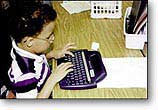

Story and Photos by Michelle McCaskill
 |
|
Sara
Glickman shows Brig. Gen. William L. Bond her latest project using
a new laptop computer.
|
But for Brig. Gen. William L. Bond, director of the Army Digitization Office in the Pentagon, many other institutions also can provide valuable solutions to the educational challenges of the next century. One such place is Mantua Elementary School in Fairfax, Va. "Teachers here are introducing pupils to important new technology," he said, explaining the reason for his visit. "We can learn from them how to train soldiers in the future."
 Mantua's
principal, Dr. Ellen Schoetzau, explained that the school last year received
laptop computers, and pupils use them for all disciplines of learning,
including math, science, language arts and history. Because pupils are
using computers at such an early age, Schoetzau explained, conventional
teaching methods are a thing of the past.
Mantua's
principal, Dr. Ellen Schoetzau, explained that the school last year received
laptop computers, and pupils use them for all disciplines of learning,
including math, science, language arts and history. Because pupils are
using computers at such an early age, Schoetzau explained, conventional
teaching methods are a thing of the past.
The portable computers have significantly changed the way teachers teach and how pupils learn, she said, because the children can independently surf the Internet to conduct research for papers and projects, work together as teams to complete assignments and share information electronically. Pupils also use the computers to deliver their homework to teachers, who send back the graded assignments with comments.
Another important way the children use the computers is to develop their own multimedia presentations and slide shows for special projects. Schoetzau said pupils have excelled in their studies by becoming active learners, more capable of working in a team setting and more responsible about meeting deadlines. And they have a new enthusiasm for learning, she said.
Bond thinks the Mantua program has a direct application to how the Army can teach soldiers new computer technology. This is especially important because soldiers will rely more on computer training through distance learning, he said. While distance learning is no longer new to most soldiers, it is still a tool that is both flexible and economical, Bond said. It allows soldiers to learn to fight on a computerized battlefield instead of using tanks, fuel, ammunition and other supplies necessary to conduct field training. "Every soldier on the battlefield of the future will use computers," he said. "They will be integrated into everything the Army does."
Using the example of a weapon system in the hands of a single soldier, he explained how computers would network platforms together to connect that soldier to his squad, which is connected upward to a company, battalion, and so on. "Everyone in that chain will use the same data and coordinate their actions through the same networks," he said.
Bond is responsible for effectively evolving the Army into a fully networked and digitized force. His goal is to have the Army fully immersed in computer technology by 2010. But he acknowledges that it isn't a simple task. "The Army is developing new technology for soldiers to use in all aspects of their jobs, but if soldiers aren't trained to use it, it's a waste," he said. "Our challenge is to train soldiers to use the technology."
He hopes the Army can implement a program similar to the one at Mantua Elementary, where teaching methods increase productivity and help create new ideas. After talking with pupils, Bond said he feels much better about future generations. "The initiative I see in these children speaks very well of the future workforce, who will be our civic leaders and teachers, our commanders and platoon sergeants of tomorrow."
About the Story and the Author
This story appeared in the September 1998 issue of the online version of Soldiers Magazine, the U.S. Army's official magazine. Since writing the story, Public Affairs Specialist Michelle McCaskill has moved from the Pentagon to the Office of Public Affairs at the headquarters of the U.S. Army Materiel Command in Alexandria, VA. You may contact her at (703) 617-0123 or mmccaskill@ALEXANDRIA-EMH1.army.mil.